Blogging Sax Rohmer’s The Return of Dr. Fu-Manchu, Part One: “The Wire Jacket”
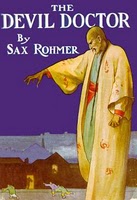 “The Wire Jacket“ was the first installment of Sax Rohmer’s Fu-Manchu and Company. The story made its debut in Collier’s on November 21, 1914 and was later edited to comprise Chapters 1-3 of the second Fu-Manchu novel, The Devil Doctor first published in the UK by Cassell and in the US by McBride & Nast under the variant title, The Return of Dr. Fu-Manchu.
“The Wire Jacket“ was the first installment of Sax Rohmer’s Fu-Manchu and Company. The story made its debut in Collier’s on November 21, 1914 and was later edited to comprise Chapters 1-3 of the second Fu-Manchu novel, The Devil Doctor first published in the UK by Cassell and in the US by McBride & Nast under the variant title, The Return of Dr. Fu-Manchu.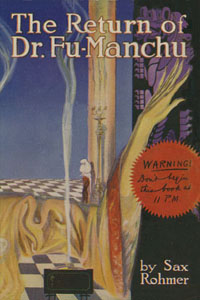
Rohmer displays an admirable economy of writing with this first sequel to Fu-Manchu. The story opens two years after the events of the original serial with our narrator, Dr. Petrie (his first name is never revealed) enjoying the company of his house guest, Reverend Eltham, the soft-spoken English cleric who 15 years earlier did much to provoke the Boxer Uprising as an intolerant missionary in China.
The two men chat amiably about Nayland Smith, who has returned to his post as Police Commissioner in the British colony of Burma. Petrie hasn’t received a letter from Smith in over two months and attributes it to a love affair gone sour that Smith hinted at in his last letter.
Modern readers may be intrigued by Petrie’s refusal to confirm whether the affair was with a woman or not when asked directly and Eltham’s subsequent remark that Burma makes a mess of a man. Add to it Petrie stating that Smith is never likely to marry now and most readers today will almost certainly conclude that Smith has had a homosexual encounter.
However, it should be noted that Petrie reflects the Edwardian reticence to discuss anything remotely intimate even among friends and his discomfort likely has more to do with Eltham’s probing than any dark secret of Smith’s that he is hiding. Petrie makes mention that Eltham is not at all common for a clergyman and his directness is certainly atypical of English social etiquette then as well as now.
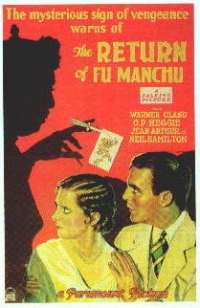 Eltham continues his line of questioning and Petrie reveals that he and Smith searched in vain through Egypt two years before for some sign of Karamaneh, the liberated servant of Fu-Manchu with whom Petrie had fallen madly in love.
Eltham continues his line of questioning and Petrie reveals that he and Smith searched in vain through Egypt two years before for some sign of Karamaneh, the liberated servant of Fu-Manchu with whom Petrie had fallen madly in love.
Eltham becomes agitated at the thought that Fu-Manchu may still be alive and drops a cryptic reference to a friend in China who is passing him information. Rohmer nicely works in not only a recap of the earlier serial, but even manages to quote Nayland Smith’s famous description of the Devil Doctor from “The Zayat Kiss.”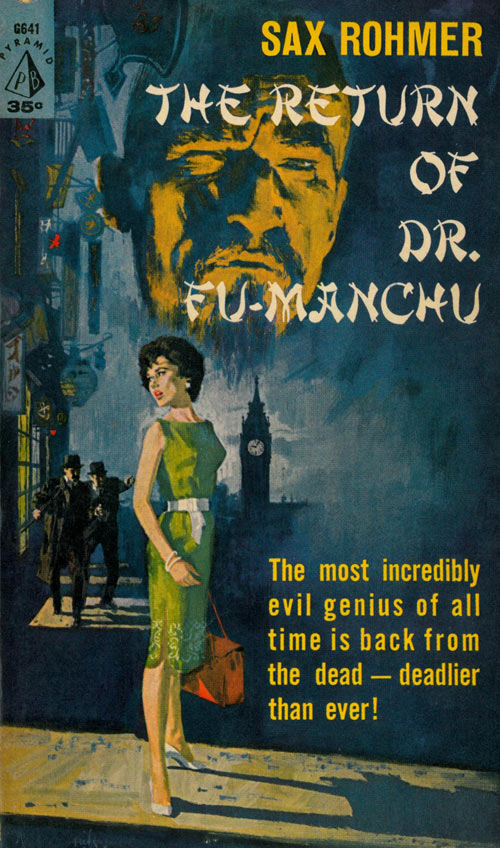
Just as things appear set to move into action, Rohmer quickly disorients the reader by having Petrie receive an urgent telephone call sending him out into the night to take care of a patient. The call turns out to be a hoax and an irritable Petrie quickly learns from Eltham that no sooner had he left than a second request for an urgent house call had been received. Dutifully, the doctor sets out once more only to realize too late that this, too is a hoax.
Angrily returning home he finds not Eltham, but Nayland Smith awaiting his return. Smith has returned unexpectedly from Burma having followed Fu-Manchu’s trail from Hong Kong to London. The Devil Doctor’s mission in England is to abduct Eltham to silence the source of information leaking out of China. Smith and Petrie quickly realize that Fu-Manchu has succeeded after cleverly distracting Petrie with the bogus house calls.
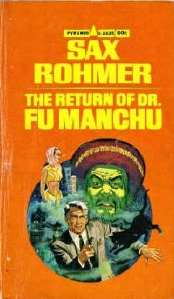 Rohmer does an excellent job of transforming a suburban neighborhood into a terror-fraught nightmare. The conviction with which he paints his paranoid fantasies is an immeasurable factor in the success of the series and the reader’s willingness to accept the threat posed by Chinese, Egyptian, and Indian people who would, under any other circumstances, be no cause for alarm or even strike one as out of place in a metropolis the size of London during the waning days of the British Empire.
Rohmer does an excellent job of transforming a suburban neighborhood into a terror-fraught nightmare. The conviction with which he paints his paranoid fantasies is an immeasurable factor in the success of the series and the reader’s willingness to accept the threat posed by Chinese, Egyptian, and Indian people who would, under any other circumstances, be no cause for alarm or even strike one as out of place in a metropolis the size of London during the waning days of the British Empire.
Smith and Petrie commandeer an automobile and a frantic pursuit of Eltham’s abductors leads our heroes to (where else?) Limehouse. There Petrie spies Karamaneh and realizes that she has been pressed back into Fu Manchu’s service. Smith was aware of this fact and tells Petrie that “she’s only a woman…and women are very much alike…from Charing Cross to Pagoda Road.” A nice bit of misogynistic advice from one friend to another that would seem to settle the question of the bitter nature of Smith’s troubled love affair once and for all.
The duo break into Fu-Manchu’s warehouse headquarters armed only with pistols and without calling Scotland Yard for back-up. There’s a nice bit where Petrie confronts Karamaneh only to discover that her memory has apparently been wiped and she has no idea who he is or how he knows her name.
Dr. Fu-Manchu is torturing Eltham in an effort to make him name his informant inside the Chinese government. Fu-Manchu correctly believes that it is the Mandarin Yen-Sun-Yat. Smith and Petrie force their way into the room and find Eltham fitted in a wire jacket, a stylized torture device consisting of mesh wiring that cuts into the flesh and can be tightened with screws to increase pressure and slice the skin.
While Smith and Petrie are in time to save Eltham’s life and liberate him from his captives, they soon discover that Fu-Manchu was never in the room with Eltham as the interrogation was conducted by way of a speaking tube from the now empty adjoining room since the Devil Doctor has had sufficient time to make good his escape.
Smith concludes that Fu-Manchu kept his identity hidden from Eltham for a very good reason and suspects that had Eltham set eyes upon him, he would have recognized the Devil Doctor as a man he knew in China before he assumed the identity of Fu-Manchu. The story comes to an abrupt finish with Smith blowing his police whistle and declaring that “the Yellow Devil is loosed on London again” as Sax Rohmer kicks Fu-Manchu and Company off with a bang leaving readers hungry for his further exploits.
William Patrick Maynard was authorized to continue Sax Rohmer’s Fu Manchu thrillers beginning with The Terror of Fu Manchu (2009; Black Coat Press). A sequel, The Destiny of Fu Manchu is due for publication in December 2011. Also forthcoming is a collection of short stories, The Occult Case Book of Sherlock Holmes and an original detective novel, Lawhead. To see additional articles by William, visit his blog at SetiSays.blogspot.com